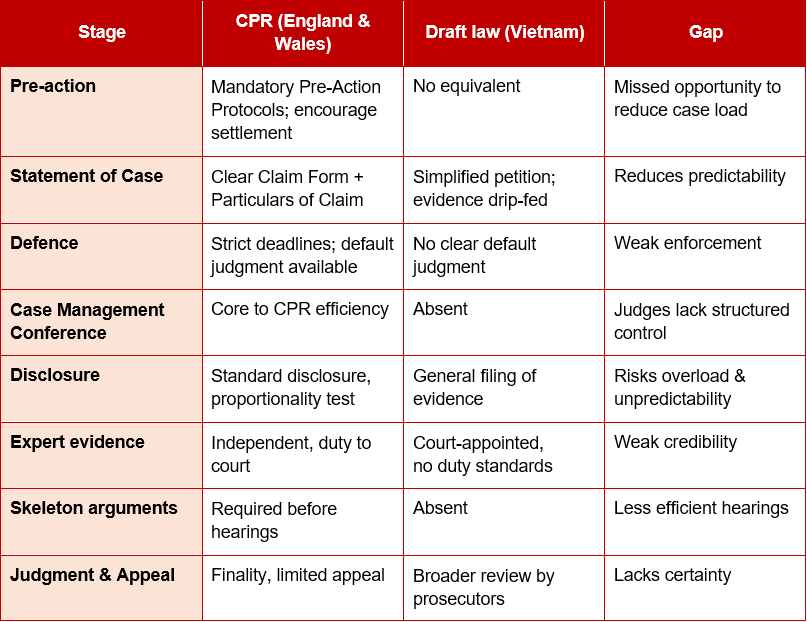.jpg)
Introduction
Vietnam is currently considering a draft law on specialised courts for its planned International Financial Centre (IFC). The ambition is clear: to provide an independent, reliable forum for resolving high-value commercial disputes. However, in its current form, the draft contains several procedural shortcomings that risk undermining investor confidence.
A useful benchmark is the Civil Procedure Rules (CPR) of England and Wales—a widely respected framework that has underpinned London’s status as a global disputes hub. When measured against CPR standards, the draft law reveals significant gaps.
Procedural shortcomings in the draft law
1. Excessive formality and lack of party autonomy
Under the CPR, the “overriding objective” ensures cases are dealt with fairly, proportionately, and at reasonable cost. Judges exercise proactive case management to encourage efficiency. By contrast, Vietnam’s draft still relies heavily on formalistic procedures and judicial direction, leaving little room for parties to shape their own proceedings.
2. Unnecessary state intervention
The draft law provides for prosecutorial (Viện kiểm sát) oversight of proceedings. This is unknown in international commercial litigation and inconsistent with investor expectations of judicial independence. CPR procedures, by contrast, are purely adversarial, with the court acting as a neutral arbiter.
3. Weak evidentiary standards
CPR provisions on disclosure (Part 31) and expert evidence (Part 35) ensure only relevant, proportionate evidence is admitted, with experts owing their duty to the court rather than the appointing party. Vietnam’s draft simply requires parties to file evidence for the court’s review, without international standards for admissibility, disclosure, or expert independence.
4. Lack of finality
CPR restricts appeals to narrow grounds (serious procedural irregularity or error of law). Investors value the certainty that judgments are final. Vietnam’s draft permits additional oversight and petitions by the Viện kiểm sát, undermining finality and prolonging disputes.
Stage-by-stage comparison

Key reforms to consider
To achieve its goal of attracting international investors, the draft law should be aligned more closely with CPR best practice. Three reforms are particularly urgent:
1. Introduce case management and the overriding objective – empower judges to run proceedings efficiently and proportionately.
2. Remove prosecutorial oversight – ensure the judiciary is independent and adversarial.
3. Adopt modern disclosure and expert standards – apply proportionality tests and impose duties of independence on experts.
Conclusion
Vietnam’s IFC project represents a bold ambition. But if its courts are to be trusted by global investors, they must look and feel like the DIFC Courts in Dubai or Singapore’s SICC: efficient, independent, and internationally recognisable. Without adopting CPR-style reforms, the risk is that the new specialised courts will be perceived as simply an extension of domestic litigation—failing to deliver the predictability and neutrality that investors demand.
